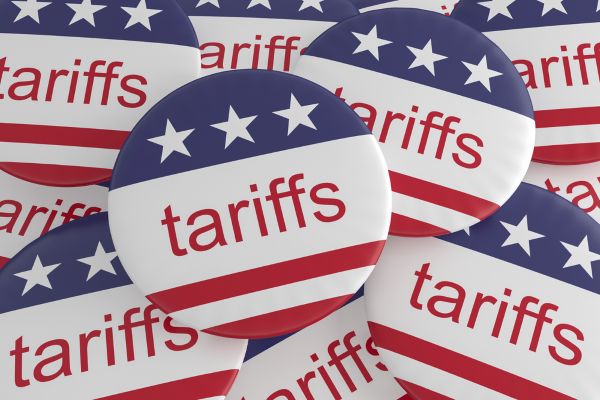U.S. trade policy threatens African Growth and Opportunity Act – Experts

Some financial experts have said the 14 per cent trade tariff imposed by the United States Government on Nigeria threatens the African Growth and Opportunity Act (AGOA).
In separate interviews with the News Agency of Nigeria (NAN) in Ibadan on Monday, the experts added that the tariff would also affect the duty-free provision.
Dr Olumuyiwa Alaba of Global Trade Governance forecasts a huge and devastating effect on Nigeria, a nation still battling the effects of COVID-19 and global economic issues.
Alaba says the universal and reciprocal tariffs across the world have brought immediate disruption to the world’s economies.
“For instance, the US stocks experienced the most severe losses since the COVID-19 pandemic, wiping out over $6 trillion in market value.
“Other expected impacts include significant pressure on global inflation, disruption of global supply chains, and diplomatic strains across the world,” he said.
He said that the 14 per cent reciprocal rate on all goods of US destination from Nigeria would, expectedly, have significant effects on Nigeria’s economy.
“It would also strain trade-related diplomatic relations between Nigeria and the United States.
“Going by the value of Nigeria total export to the US in 2023, the immediate casualty is the US$5.7 billion export to the US, of which US$3.8 billion benefitted from the US-Africa trade diplomacy, the African Growth and Opportunity Act (AGOA), duty-free provision, of which about 98% is oil and gas.
“Specific and multiplier impacts will be felt in Nigeria in several critical areas, including significant effects on AGOA-related non-oil sector exports, particularly textiles, agricultural products, and agro-processing,” Alaba said.
According to him, the United States of America’s ‘Day of Fury’, called the Day of Liberation, could undermine the competitiveness of Nigeria’s exports to the US.
This, he said, would particularly strain agriculture and textiles, two sectors that employ millions of Nigerians.
Alaba called for immediate proactive measures to mitigate the impacts by exploring alternative markets to prevent job losses in the critical sectors.
He said the action could also trigger reciprocal actions from Nigeria.
“If Nigeria decides to go through the reciprocity route, it may further exacerbate already high inflationary pressure in Nigeria, as the reciprocal rate from Nigeria will hurt consumer choices and disposable income.
“It will also impact the import of intermediate inputs and machinery, which may drive cost-push inflation in Nigeria.
“What should Nigeria and the rest of the world do?
“Since the Trump administration claims that its action is a mild reciprocal action to the tariff rates other nations administer on US imports to their countries, the diplomacy route is the ‘highway’ to solving this global conundrum orchestrated by the Trump 2.0 regime,” Alaba said.
Meanwhile, a financial consultant, Mr Tunji Adepeju, says it’s not likely the AGOA will be renewed again.
According to him, AGOA was inaugurated during the President Bill Clinton administration, and has since been renewed every two years at the end of September.
“Well, as I said, I think President Trump just makes too much noise. There is nothing new in what he has done.
“Every country does it. If you are importing vehicles from wherever in Nigeria, you have to pay so-so as tax, at least customs duty, and all the rest.
“So, I don’t see much happening with him. But what I think he is trying to do is just to create some avenue for negotiation,” Adepeju said.
However, he commended the Tinubu-led administration for diversifying the nation’s economy and promoting non-oil sector exportation.
“Nigerian goods will still continue to grow there, and most likely, they will be cheaper to buy than similar goods coming from other countries, especially if we pay attention to value addition and quality.
“I will give kudos to the government. In the past, when we did our budgets, almost 90 per cent of our revenue came from crude oil sales.
“But I think that in recent times, it has been brought down to about 75 per cent. We are developing our mineral resources,” Adepeju said.
According to him, the agricultural sector is being upgraded for exports and focusing on value addition, instead of exporting raw produce, will give Nigeria the competitive edge.
“For example, if you send out cocoa beans to the US or other places like Sweden, and we import chocolate, that’s not a good business.
“For now, we should try to convert our cocoa beans into chocolate and whatever can be produced from it,” Adepeju said.
Meanwhile, in Sunday’s release of the Minister of Industry, Trade and Investment, Dr Jumoke Oduwole, the government noted that non-oil products, previously exempted under AGOA, now faced potential disruption.
It added that the new 10 per cent tariff on key categories may impact the competitiveness of Nigerian goods in the US for businesses in the non-oil sector.
“These measures present destabilising challenges to price competitiveness and market access, especially in emerging and value-added sectors, vital to our diversification agenda.
“SMEs building their business models around AGOA exemptions will face rising costs and uncertain buyer commitments,” it stated.












